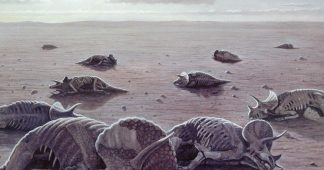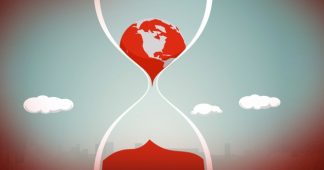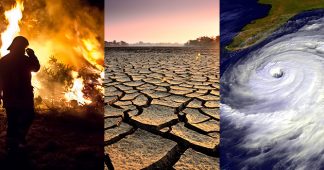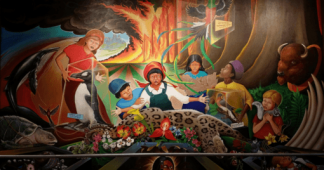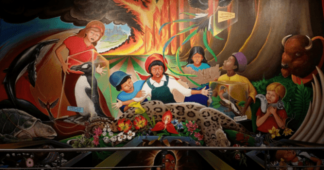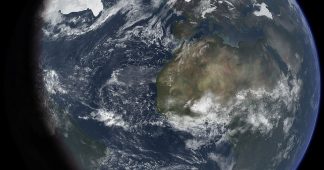Indigenous populations are taking the lead in protecting the environment
By Shane Quinn
July 31, 2018
The rate of global species extinction is today roughly what it was 66 million years ago, after an asteroid six to nine miles across careered into south-eastern Mexico, quickly wiping out the dinosaurs and much else. The force of the asteroid, which struck the planet at the end of the Cretaceous period, was over a billion times stronger than the atomic bombs dropped on Hiroshima and Nagasaki in 1945.
Now, the human species is approaching the destructive equivalent of this asteroid. Due to expanding human activity, scientists estimate that each day extinction is being inflicted upon 150 to 200 species of plant, insect, bird and mammal.
The earth has indeed not witnessed the current level of extermination in over 65 million years, when 75% or more of all species were wiped out. Except for adaptable creatures such as leatherback sea turtles, crocodiles and sharks, no animal weighing more than 25 kilograms (55 lbs) survived the asteroid’s legacy. Its collision resulted in the global extinction phenomenon of “impact winter” whereby, upon hitting Mexico, enormous volumes of sulfur, ash and dust rose into the stratosphere, spreading globally and blocking out most sunlight. It is a similar consequence expected to that of nuclear war, something humans have been very fortunate to avoid so far.
Unfortunately, the “dinosaur asteroid” struck a vulnerable area, the shallow waters of Mexico’s Yucatan Peninsula, which greatly exacerbated its impact. Global temperatures decreased by as much as 47 degrees Fahrenheit (26 Celsius) which halted photosynthesis, the critical process that all plants and other organisms such as plankton depend on. It was a death knell for species across the spectrum. Even the seemingly invulnerable apex predator Tyrannosaurus rex – which was present in what is today the western United States – was doomed within years because of the disappearance of its plant-eating prey, including the Triceratops.
It is revealing that the human race is now rivaling this onslaught. By doing so, humans are placing themselves at peril as they eliminate the environment upon which they rely on to survive. Much of the blame for the increasingly harmful effects can be laid at the door of the world’s rich states, many of which are located in the West such as the US, the United Kingdom, Ireland, Switzerland, Germany, Belgium, etc.
The human assaults upon the earth have sharply risen in intensity over the past 40 years – as the deadly era of corporate neoliberalism, aided by compromised governments and media, pushes countless species over the edge. The wealthy nations most responsible for the crisis have wrought a new geological age upon the globe, the Anthropocene, which can be traced to the Industrial Revolution beginning in Great Britain in 1760.
The Anthropocene is the era in which humans are overwhelmingly impacting the climate and environment. The most serious outcome of this global assault is climate change, which is rapidly worsening while reducing to derision conservative and pseudo-scientific forecasts. Should current government policies continue, it bodes ill for the condition of the world by the year 2100. Based on current trends a recent study from the medical journal, Lancet Planetary Health, reveals that 80 years from now 150,000 people in Europe are expected to perish annually due to heat waves.
Despite the threats, in which climate change and nuclear weapons cast a shadow over everything, there is barely a word of warning coming from establishment circles. For many months, front page news has been focused on the nonsense of “Russian meddling” in the US election and “Brexit negotiations” – while subjects that define the earth go unmentioned or cast to the shadows.
Over the previous four decades governments, mainstream media and television networks have surrendered to the growing power of financial institutions – whereby the public has little input in the information they receive. One need only open a major newspaper today to find 20-page supplements dedicated to business or property, while a fraction of that is afforded to world news events.
The situation is further exacerbated by the ongoing decline of intellectual culture in the West. Influenced by abundant commercial propaganda, large sections of first world populations have been diverted towards superficial consumerism, distracted by the latest technology and other fabricated wants. Traditional, and important activities, such as the reading of books and other literature has become a rarer sight. In March 2018, it was reported that one in four Americans had not read a single book within the past year. This has been a continuing trend across the West and is already having serious implications, leading to the “decline of the public intellectual”.
Meanwhile, also high on the rich list of culpable states are the oil nations of Saudi Arabia, Qatar, Kuwait and the United Arab Emirates, all backed by the West despite having dire human rights records. In one of the great ironies, should the reliance on lethal fossil fuels like oil continue, states like Saudi Arabia and Qatar will become desolate wastelands in years to come. Its citizens are already suffering unduly from the very substance their countries’ elites have grown affluent on.
Saudi Arabia, the world’s largest exporter of oil, is forecast to expect a three to five degree Celsius rise in temperature by the end of this century, making an already sweltering country virtually uninhabitable for humans and much else. Last summer in Saudi Arabia, record temperatures of 127 degrees Fahrenheit (53 Celsius) were recorded in central and eastern parts of the country.
All of the above states have grown rich by their continued plundering of natural resources, therefore increasing the responsibility they now bear to the planet. In another great irony, leading the way in protecting the world are the so-called “primitive” indigenous populations, who seek to preserve habitats by keeping fossil fuels like oil in the ground, where it belongs, and protecting rainforests.
For the past five centuries, the Anglo-Saxon and other European races have exploited continents such as Africa and the Americas, acquiring riches at the expense of others. Today, one can witness the horrendous behavior of the far-right Italian government – which refuses to accept migrants from African countries that Benito Mussolini invaded in the 1930s and 1940s, such as Tunisia, Egypt and Ethiopia. Following Fascist Italy’s attack on Ethiopia in 1935, Mussolini’s forces killed tens of thousands of its inhabitants, yet an Ethiopian immigrant is now barred entry to Italy.
In the US, Donald Trump’s administration is rejecting people fleeing from Central America – migrants departing countries such as El Salvador and Guatemala, which have not recovered from the Ronald Reagan-backed invasions of the 1980s. Nor are many from Honduras now allowed citizenship in America. This despite a 2009 US-supported coup which helped turn Honduras into one of the poorest and most violent countries in the world. Hondurans are also suffering due to worsening climate change, despite hardly contributing to the problem; the US is further accountable as it produces the second highest greenhouse gas emissions on earth.
Ireland, a crucial ally and outpost of American corporate power, has also become a major culprit in regard to climate change – having long had among the worst climate records on the European continent. With a population well below 10 million, Ireland emits more carbon emissions than 400 million of the planet’s poorest inhabitants, which is over 5% of the entire human population. The disreputable behavior of Irish governments, in their attempts to shift climate responsibility onto others, has largely been shielded from public eyes by establishment centers.
However, some light has been cast on the dark workings of power by Ireland’s chief climatologist, John Sweeney, one of the few critical voices heard coming from the abyss of silence. Sweeney wrote recently that Irish government figures were “begging for concessions on every available front at EU negotiations for the period 2020-2030… The reason for this unseemly performance is that the people of Ireland have lost political control of climate change policy to powerful vested interest groups. Our negotiating position is determined not by the needs of our children and grandchildren, but by the short term needs of those who can exert most influence”.
Sweeney, emeritus professor of geography at Maynooth University, has accused the state’s politicians of “freeloading on the efforts of others”, calling Ireland “a delinquent country” for failing to reduce its carbon emissions which are actually rising. The pattern can be seen elsewhere. In the case of America, most senior Republican Party members deny that climate change is even occurring – while they pursue policies such as ongoing extraction of oil and coal that quickens the race to the precipice.
American politicians may ridicule climate change in public, with Trump himself describing it as “a hoax”, but whether they do so in private is another matter. There is ample evidence to suggest the American president believes that climate change is taking place. For instance, why was Trump so insistent that a large wall be built to protect his golf resort on the west coastline of Ireland? Because of deteriorating climate change, the area is clearly vulnerable to rising sea levels and worsening Atlantic storms, as Trump was very likely informed. His proposal for the 38,000 ton wall was approved last December despite serious environmental objections.
As can be seen again, the corporate ideology is based on attaining short-term profits (“jobs”) at whatever the cost, even if it results in unremitting harm to the planet.
